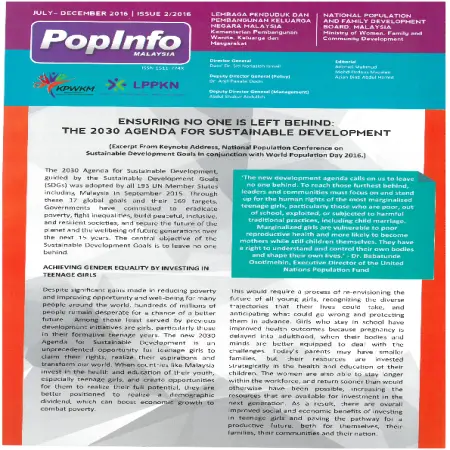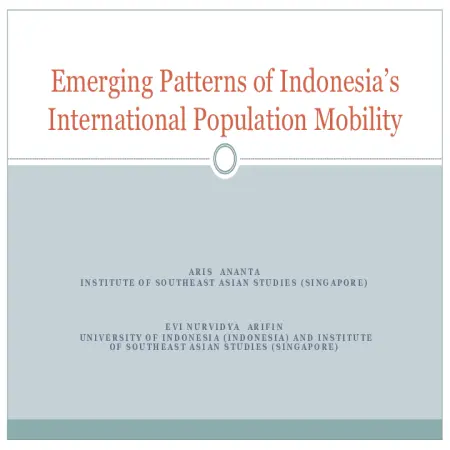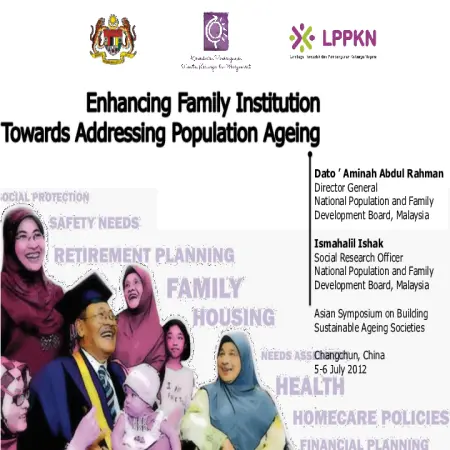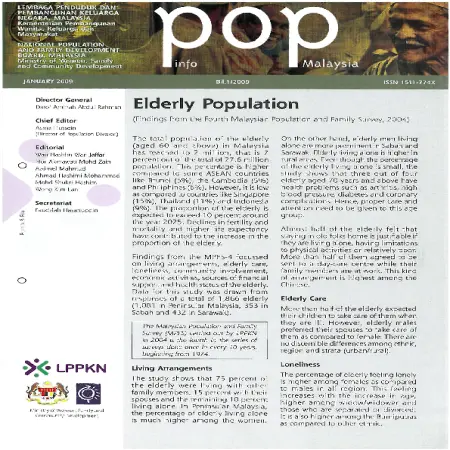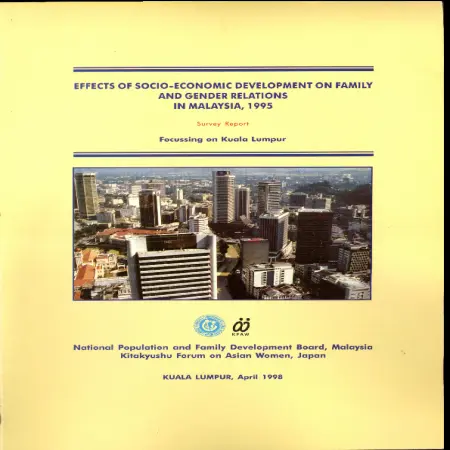TOPICS
Results for Topics : "Population"
|
|
Empowering single mothers through institutional support: lessons from single mothers in Sabah
Item Type: Article
Editor:
Year: 00/12/2021
Abstract: Life can be challenging for single mothers. They are viewed as the most vulnerable social groups in society who often lack educational attainment, skills and social networks; thus, limiting their opportunities to compete in the labour market. Consequently, single mothers struggle to achieve financial independence and to support the well-being of their family. To help single mothers build a better life, it is crucial to provide single mothers with solid institutional support programmes. This paper explores the extent to which the institutional support programmes designed for single mothers are in accordance with the needs and expectation of the single mothers in Sabah. The views obtained from the leaders of the single mother associations show that the support programmes are useful for single mothers; however, the programmes are still inadequate to lift them out of poverty. Suggestions for improvement of the institutional support programmes for single mothers are highlighted.
|
|
|
|
|
|
Ensuring no one is left behind: the 2030 agenda for sustainable development
Item Type: Newsletter
Editor:
Year: 00/00/2016
Abstract: The 2030 Agenda for Sustainable Development, guided by the Sustainable Development Goals (SDGs) was adopted by all 193 UN Member States including Malaysia in September 2015. Through these 17 global goals and their 169 targets, Government have committed to eradicate poverty, fight inequalities, build peaceful, inclusive, and resilient societies, and secure the future of the planet and the well being of future generations over the next 15 years. The central objective of the Sustainable Development Goals is to leave no one behind.
|
|
|
|
|
|
Emerging patterns of Indonesia's international population mobility
Item Type: Conference or Workshop Item
Editor:
Year: 00/00/2013
Abstract: This paper attempts to examine some new trends in Indonesia’s international migration, both out-migration from and in-migration to Indonesia. More and more Indonesians have moved to other countries to pursue higher education, job opportunities and to settle down. On the other hand, rapid economic growth and the large consumer market have attracted increasing number of foreigners to work and invest in Indonesia. International population mobility is becoming a more important demographic process, with profound ramifications on economic development in Indonesia and other countries, in ASEAN and beyond.
|
|
|
|
|
|
Enhancing family institution towards addressing population ageing
Item Type: Conference or Workshop Item
Editor:
Year: 00/00/2012
Abstract: Malaysia will be aged by the year 2030. The objective of National Policy for Older Persons, 2011 is to enhance the respect for and self-worth of the elderly in family, society and nation at the same time to develop the potential of the elderly so that they remain active and productive in national development and to create opportunities for them to continue to live independently and to encourage the establishment and the provision of specific facilities to ensure the care and protection of the elderly. The areas of Plan of Action: Promotion and Advocacy, Lifelong Learning, Safety and Protection, Governance and Shared Reasonability, Involvement and Intergenerational Solidarity, Research and Development.
|
|
|
|
|
|
Elderly population
Item Type: Newsletter
Editor:
Year: 00/01/2009
Abstract: The total population of the elderly (aged 60 and above) in Malaysia has reached to 2 million, that is 7 per cent out of the total of 27.6 million population. The proportion of the elderly is expected to exceed 10 per cent around the year 2025. Finding from the MPFS-4 focussed on living arrangements, elderly care, loneliness, community involvement, economic activities, sources of financial support and health status of the elderly. Data for this study was drawn from responses of a total of 1,866 elderly.
|
|
|
|
|
|
Effects of socio-economic development on family and gender relations in Malaysia, 1995: focussing on Kuala Lumpur
Item Type: Research Report
Editor:
Year: 00/04/1998
Abstract: This study attempts to inquire into the effects of socio economic development on families and gender relations in Malaysia societies living in urban areas, focusing on the capital city of Kuala Lumpur. These effects which the research attempts to study are found in the everyday lives of the Malaysian families such as family bonds, family satisfactions, identities, attitudes, norms, conjugal relations, parent and child relations and the family's support network. A total of 1,200 respondents consisting of males and females, aged 18 years and above living in and around Kuala Lumpur and within the Klang Valley had been selected for the survey.
|
|
|
|






